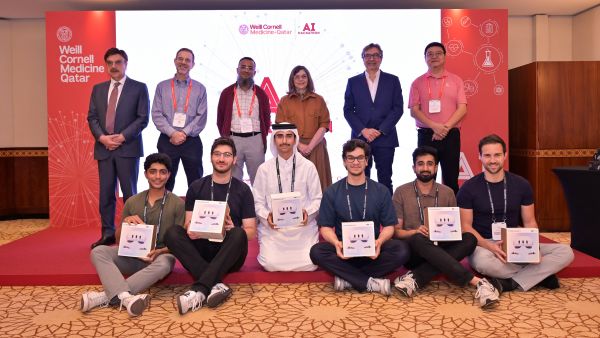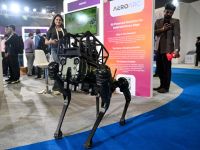First WCM-Q AI Hackathon drives tech innovation in healthcare

Weill Cornell Medicine-Qatar (WCM-Q) hosted its first AI Hackathon – a collaborative, interdisciplinary event that brought together medical students from WCM-Q with computer science students from Cornell University and Cornell Tech to co-develop AI-driven solutions for real, pressing clinical challenges.
The two-day event, titled “MedAI Hack Collaborative: Unlocking Precision Health with AI,”
co-sponsored by Dr. Javaid Sheikh, dean of WCM-Q, and Dr. Curtis Cole, global chief information officer of Cornell University, marked a milestone in WCM-Q’s mission to champion innovation at the intersection of medicine, data science, and technology.
Six interdisciplinary teams took part, merging the clinical knowledge of WCM-Q students with the technical expertise of Cornell University and Cornell Tech computer science students, fostering creativity, teamwork, and problem-solving at the forefront of medical AI. Each of the six teams addressed a different clinical challenge: federated learning for clinical risk prediction, simulating clinical trials with real-world data (target trial emulation), predicting tumor subtypes in breast cancer, medical imaging: automatic polycystic ovarian morphology classification, early prediction of postpartum depression, and leveraging wearable device and synthetic clinical data for predictive health insights.
“Events like this hackathon are so valuable, given the major disruptions that are taking place in technology, education, healthcare, and indeed in almost all sectors,” Sheikh said. “Initiatives which bring together people from different regions and unite diverse academic disciplines, truly represent the best opportunity to take advantage of new technologies by applying them in creative and innovative ways to enhance healthcare outcomes. All of us at WCM-Q are very grateful to everyone who attended, shared their expertise and demonstrated wonderful creativity to produce some excellent projects.”
The teams were also guided by experts in clinical medicine, biomedical research, radiology, AI innovation, data science, and health informatics, while a team of mentors comprising Cornell faculty, WCM-Q faculty, and WCM-Q clinical alumni, provided continuous technical and clinical guidance to help students refine solutions and ensure real-world relevance.
“The hackathon itself was a fantastic learning experience for the computer science students to discover what it’s like to work within a complex field like medicine, and also a fantastic experience for the medical students to see what the future of computing can do to improve health and healthcare,” Cole said. “At another level, it was a profound experience for Weill Cornell Medicine (WCM) to bring students from the U.S. and Qatar together to work toward a common goal, which really showed the amazing things this incredible university can do for our students and our society at the global level.”
"The hackathon truly demonstrated the power of interdisciplinary collaboration across continents,” said organizing committee member Ayham Boucher, head of AI innovations for both the Cornell Information Technologies at the Ithaca campus and Information Technologies & Services (ITS) at Weill Cornell Medicine, and lecturer of Information Science in the Cornell Ann S. Bowers College of Computing and Information Science. "Seeing our CS students in New York and medical students in Qatar collaborate so seamlessly, learning from each other, sharing perspectives, and solving real healthcare challenges, was remarkable. This experience has laid the foundation for a new generation of interdisciplinary thinkers."
The hackathon concluded with a dynamic pitch session, in which the teams presented their AI-powered healthcare solutions to a distinguished panel of academic, clinical, and industry experts, which included Dr. Cole; Dr. Thurayya Arayssi, vice dean for academic and curricular affairs at WCM-Q; Dr. Fei Wang, associate dean for data science and artificial intelligence at WCM; Dr. Mohamed Elsherif, assistant professor of clinical medicine at WCM-Qand consultant in endocrinology and obesity medicine at Hamad Medical Corporation; and Dr. Johnny Awwad, executive chair of women's services and division chief of reproductive medicine at Sidra Medicine.
The judges selected as winners the “Federated Nomads” team, which addressed the federated learning for clinical risk prediction challenge, in recognition of their creativity, technical rigor, and the potential to transform healthcare delivery. The winning team comprised WCM-Q medical students Mahmoud Yousef, Kareem Ali, and Aqib Abdul Rahman; WCM-Q pre-medical student Mohammed Abdulla; Cornell University computer science student Vignesh Rangarajan, M.Eng ’26, and Yann Hicke, a doctoral student in the field of computer science.
Abdulla said: “I learned so much and got to see how the technical and AI side and the medical side could be integrated. It was really amazing to have the chance to work on this problem and to find a solution through collaboration with students working in a completely different subject area. I feel that taking part in hackathons will enable me to explore different developments in medicine and technology, which in the future will allow me to be a more effective physician.”
Miriam Alex, a master’s student at Cornell Tech, said: “The hackathon was a great experience – I think the best part was working with the med students – the team members in my group knew so much about healthcare and were so passionate about medical technology, which gave us a different and very valuable perspective. The event really highlighted that with the new wave of AI there is huge potential for computer scientists and doctors to work together to solve a lot of difficult medical challenges.”
“It was inspiring to see how technical and medical perspectives came together.” said Hope Best ‘26, a computer science major at Cornell. “I gained a deeper appreciation for how machine learning can directly shape patient care and healthcare innovation.”
Background Information
Weill Cornell Medical College in Qatar
Weill Cornell Medicine - Qatar is a partnership between Cornell University and Qatar Foundation. It offers a comprehensive six-year medical program leading to the Cornell University M.D. degree with teaching by Cornell and Weill Cornell faculty and by physicians at Hamad Medical Corporation (HMC), Aspetar Orthopedic and Sports Medicine Hospital, the Primary Health Care Corporation, the Feto Maternal Center, and Sidra Medicine, who hold Weill Cornell appointments. Through its biomedical research program, WCM-Q is building a sustainable research community in Qatar while advancing basic science and clinical research. Through its medical college, WCM-Q seeks to provide the finest education possible for medical students, to improve health care both now and for future generations, and to provide high quality health care to the Qatari population.






